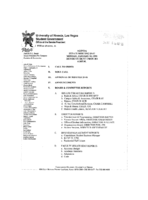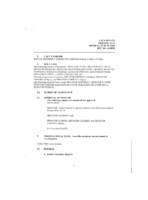Search the Special Collections and Archives Portal
Search Results

Robert Kim oral history interview: transcript
Date
Archival Collection
Description
Oral history interview with Robert Kim conducted by Kristel Peralta, Cecilia Winchell, Ayrton Yamaguchi, and Vanessa Concepcion on March 05, 2021 for the Reflections: The Las Vegas Asian American and Pacific Islander Oral History Project. In this interview, Kim describes his career in law. He talks about his Korean roots, the model minority myth, and experiencing racial discrimination. Lastly, Kim discusses the Las Vegas Asian American and Pacific Islander (AAPI) community, his involvement with the Asian Bar Association of Las Vegas, and the importance of electing Asian Americans into political positions.
Text

Transcript of interview with Anthony A. Marnell II by Stefani Evans and Claytee White, September 29, 2016
Date
Archival Collection
Description
Twentieth-century visitors to the Las Vegas Sands Hotel experienced the masonry work of Anthony A. Marnell, who removed his family from Riverside, California, to North Las Vegas in 1952 in order to build that structure. When he formed his own masonry company in 1958, he taught his namesake nine-year-old son the skills of a mason and the value of honest work. The younger Marnell learned all he could about construction from his father and completed his education by graduating USC School of Architecture in 1972, serving his apprenticeship, and becoming licensed in 1973. After designing McCarran Airport's A and B Gates, he teamed up with Lud Corrao in 1974 to form Marnell Corrao Associates, the first design-build firm in Southern Nevada. Marnell Corrao built many of Southern Nevada's most iconic hotel-casinos including the California Hotel, Maxim Hotel, and Sam's Town and Steve Wynn and Treasure Island, The Mirage, Bellagio, and New York New York as well as the Rio All-Suite Hotel and Casino and the M Resort Spa Casino. In this interview, the Riverside native speaks to the importance of teaching future generations about the value of work, of earning the sense of accomplishment, and of fueling one's inner spirit. His philosophy built a work environment that encouraged employee longevity from the beginning in 1974 (he is employee number one, and his assistant is employee number two). He talks of the American Institute of Architects (AIA), of entrepreneurial gamesmanship, and of casino greats Bill Boyd, Jay Sarno, Cliff Perlman, Kirk Kerkorian, and Steve Wynn. He describes the evolution of Las Vegas resorts from prioritizing casino games to fine dining to night clubs and entertainment. He credits his own Rio staff tradition of serving Chef's Table to the employees and the Rio's award-winning chef, Jean-Louis Palladin, for beginning the Las Vegas food renaissance in the late 1990s that rebranded Las Vegas as a Mecca for celebrity chefs. The nine-year-old who worked part time in his father's masonry business learned his lessons well, much to the benefit of Southern Nevada's growing skyline, its residents' growing waistlines, and its businesses' growing bottom lines.
Text

Charles Scott Emerson oral history interview: transcript
Date
Archival Collection
Description
Oral history interview with Charles Scott Emerson conducted by Claytee D. White on December 21, 2017 for the Remembering 1 October Oral History Project. In this interview, Charles Scott Emerson discusses his work with the American Red Cross and the disaster relief the organization provided during the aftermath of the October 2017 mass shooting in Las Vegas, Nevada. The interview begins with a discussion on Emerson's early life and career in Missouri and how he moved to Las Vegas in 2004. Emerson talks about the American Red Cross response plans and coordinated operations that are in place for when the community is faced with a disaster, going into specific detail on the community-wide response to the October 1, 2017 shooting. He gives a behind-the-scenes glimpse into how relief work is organized, using this interview as a chance to praise the hidden heroes of the October 2017 tragedy, including the people at the Family Assistance Center, the Attorney General's Office, the Driver's License Bureau, and the Coroner's Office, as well as mental health providers, child care workers, blood donors, and more. Throughout the interview, Emerson puts special emphasis on the importance of community in order to offer support in the aftermath of a tragedy as well as to prevent a man-made tragedy from occurring again.
Text

Jose Leonardo Martinez oral history interview: transcript
Date
Archival Collection
Description
Oral history interview with Jose Leonardo Martinez conducted by Barbara Tabach and Nathalie Martinez on August 19 and 29, 2020 for the Latinx Voices of Southern Nevada Oral History Project. Session 1: Jose discusses his childhood and what it was like growing up during the Salvadoran Civil War. He recounts the dangers he's faced and how he made his way to the United States after traveling through Guatemala and Mexico. Subjects discussed include: Salvadoran Civil War; Ciudad Arce, El Salvador; Guatemala; Mexico; Los Angeles, California. Session 2: Jose continues his discussion of growing up in El Salvador and the violence he witnessed in the country's army during the 1980s. He also talks about his personal life after moving to the United States and his experiences navigating gang culture in Los Angeles, California. Jose recounts his previous jobs, his schooling, how he met his wife, and his family's move to Las Vegas. Subjects discussed include: El Salvador army; gang violence.
Text

Meeting minutes for Consolidated Student Senate University of Nevada, Las Vegas, January 30, 1995
Date
Archival Collection
Description
Text

Kaku Makino and Masako "Julie" Ishitsuka oral history interview: transcript
Date
Archival Collection
Description
Oral history interview with Kaku Makino and Masako "Julie" Ishitsuka conducted by Kristel Peralta, Vanessa Concepcion, Ayrton Yamaguchi, and Stefani Evans on March 22, 2021 for the Reflections: The Las Vegas Asian American and Pacific Islander Oral History Project. In this interview, Makino discusses his early life in Tokyo, Japan and becoming a chef. He recalls arriving to the United States in 1989, establishing the Todai (now Makino Sushi & Seafood Buffet) restaurant chain, and opening nineteen locations in California, Florida, and in Hawaii. Kano talks about her upbringing in Otsu, Shiga Prefecture, Japan and describes Japan during the Meiji era. She remembers arriving to Las Vegas, Nevada in 2000 and the cultural change she experienced. Lastly, Makino and Kano discuss the restaurant industry during the COVID-19 pandemic.
Text

Meeting minutes for Consolidated Student Senate, University of Nevada, Las Vegas, June 28, 2004
Date
Archival Collection
Description
Text

Transcript of interview with Jacqueline Baskow by Barbara Tabach, October 24, 2016
Date
Archival Collection
Description
In 1976, Jacqueline "Jaki" Baskow was an aspiring actress when she and a friend accepted an invitation to worked in a movie studio in Las Vegas. She had three-hundred dollars to her name, a dream and lots of dynamic energy. Though the movie studio offer did not quite materialized as she hoped - the invitation had come from Batman co-creator Bob Kane - Jaki's trajectory into Las Vegas, working with talents and planning events became an over forty year career. In this interview, she talks about growing up Jewish in Camden, New Jersey where her father was a murder victim; her tenacious effort to find the perpetrator included the help of celebrity detective Joe Schillaci. She shares stories of the colorful array of A-list entertainers she has worked with to build her successful business, Baskow and Associates. She has built a niche of handling large corporate events, hiring talent and attention to details for exciting events. She reflects on the people and moments that impelled her on; mentors such as Bobby Morris and Frank Sinatra and Jilly Rizzo.
Text

Amber Diskin oral history interview: transcript
Date
Archival Collection
Description
Oral history interview with Amber Diskin conducted by Barbara Tabach on January 5, 2018 for the Remembering 1 October Oral History Project. In this interview, Amber Diskin discusses her experience at the Route 91 Harvest music festival during the October 1, 2017 mass shooting in Las Vegas, Nevada. Diskin talks about finding her way home after escaping the crowds and letting her family and friends know she was not hurt. She speaks of the aftermath of the shooting, including how her children were affected, the post-traumatic stress disorder she developed, and how the shooting has affected her love of concerts. As a native Nevadan, she shares her views of Las Vegas and how her sense of community deepened after this event. Diskin ends the interview by discussing her appreciation for the first responders and the gift baskets she helped distribute to hospitals, police stations, and the fire department.
Text

Interview with Raymond Chester Harbert, February 18, 2005
Date
Archival Collection
Description
Text
